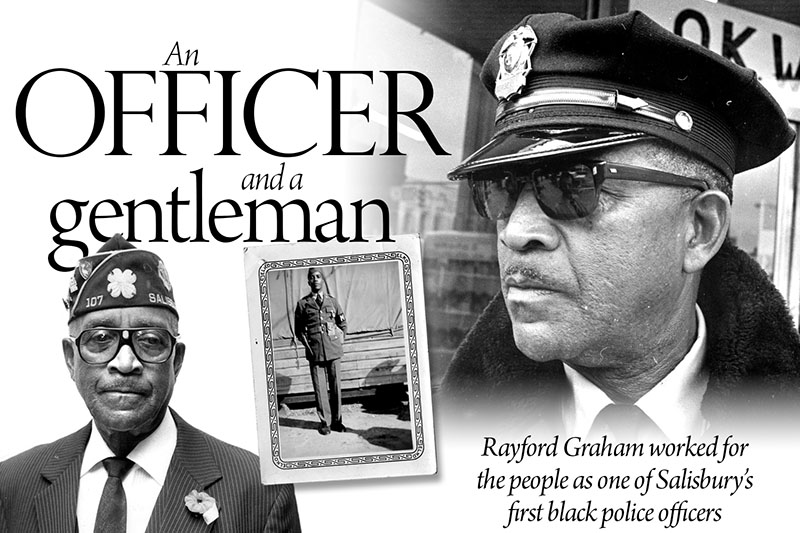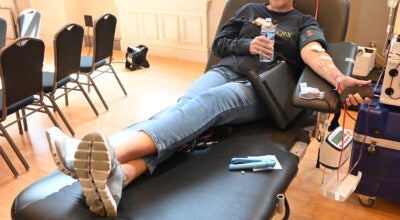Black History Month: Rayford Graham worked for the people as one of Salisbury’s first black police officers
Published 12:10 am Monday, February 13, 2017

- Graphic by Andy Mooney, Salisbury Post.
By Deirdre Parker Smith
deirdre.smith@salisburypost.com
SALISBURY — Rayford Graham died almost 10 years ago at the age of 94, leaving an impressive legacy of accomplishments, including serving for 26 years as a Salisbury police officer.
In 1949, the hiring of Graham and Alonzo Grant was called an “experiment in race relations.” They were known as the first Negro officers on the force, although a black man served on the force in the late 1800s.
The two worked from 4 p.m. to midnight. Grant, a native of Michigan and graduate of Hampton Institute, had been the Rowan County Negro Farm Agent. He stayed on the job just two years, moving to California.
At first, the city put Graham and Grant on a standard six-month probation. A report from the day said their “activities were confined exclusively to the Negro race.”
Chief Dave Shuler changed that policy when his confidence in Graham grew. Shuler told him he could arrest a white person if he wasn’t anyone important, such as a doctor or lawyer.
Graham told the Post in 2004 that the first white man he took to the magistrate’s office asked him where the white officers were.
Change was slow in coming.
Yet in 1971, Graham received a citation from the Salisbury City Council for “dedicated service to the community and his exemplary service with the Salisbury Police Department.” The citation, signed by then-Mayor Elmer L. “Sonny” Allen Jr., says Graham “has created an atmosphere of respect and good will throughout our community.”
Graham was recognized for his work with youth, saying his dedication “builds a more solid foundation for understanding between people for the future.”
That was just one of many honors Graham received. His living room walls in 2004 were covered with certificates and plaques, and he told reporter Mark Wineka he had other awards in the house that he had never framed.
After retirement, he created another legacy as a volunteer. He worked with Gethsemane Baptist Church, the American Legion, the Veterans Service Council, the VA Medical Center, Masonic Lodge, West End Community Organization, J.C. Price High Alumni and the NAACP, among other groups. He logged almost 6,000 volunteer hours at the VA and sometimes helped transport patients from Salisbury to Durham.
He earned Service Officer of the Year awards in 1979, 1989 and 1990. He was nominated again in 2001, cited for visiting sick and shut-in veterans. He also transported widows to the county service office to help them get their entitlements.
Graham twice received Dr. Martin Luther King Jr. Humanitarian awards. In 1975, he retired as a sergeant detective. He described how people knew him well. “I can walk anywhere in Salisbury and people say ‘Hello, Mr. Graham’ or ‘Good morning, Mr. Graham.’
“I have even been arresting somebody and somebody will walk up, even somebody I’ve arrested before, and say, ‘Do you need any help, Mr. Graham?’ ”
He said then, “Being a policeman is pretty rough. Sometimes you just want to give it up and quit, but peace and harmony in the department and with the city help to make a great department.”
In the fall of 1970, he and fellow officers Ernest Davis and Robert Harold Cowan served on “the permanent project area committee for urban renewal of the west end.” Davis was elected chairman.
This was the group involved in what was called urban renewal. It resulted in many homes being torn down in the area known as West End, to be replaced with public housing.
It could not have been an easy task, going through the surveys, telling people their houses were too dilapidated to save.
Graham told the Post in 2004 his police job was one “I never really did enjoy,” but he had a family to support and he was selected by Shuler in 1949 because of his years as a military policeman during World War II.
Graham said he was glad he stuck with the job as long as he did but that when he turned 62, he thought a younger person would do a better job.
Graham said he never fired his gun at anyone. He drew his gun once and shot into the air to freeze a fleeing suspect.
A drunk once punched him in the face and broke his glasses. Graham charged the man with bring drunk, not drunk and disorderly, but the judge added that charge when he heard what happened.
He was known for always writing everything down in case he had to testify so defense attorneys couldn’t trip him up.
In his days on the force, officers and revenuers still chased bootleggers and conducted raids on illegal lotteries, often called “butter and eggs” because the winning numbers were the daily butter and egg prices in the newspaper.
He was drafted into military service but stayed stateside, eventually traveling through at least 30 states for his duties.
Graham had not been able to finish at Price High School because of the war, but he got his diploma just months before being hired as a police officer. At the same time, he worked at Rowan Memorial Hospital.
Under his photo in the Price yearbook was this quote: “Do all the good you can, to all the people you can, in all the ways you can, just as long as you can.”
Graham did just that for 94 years.


